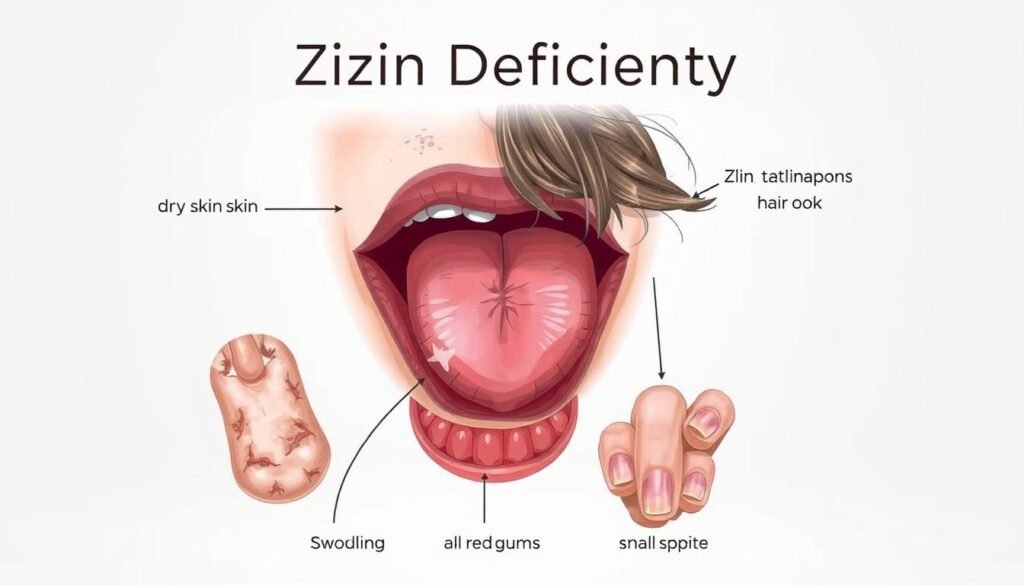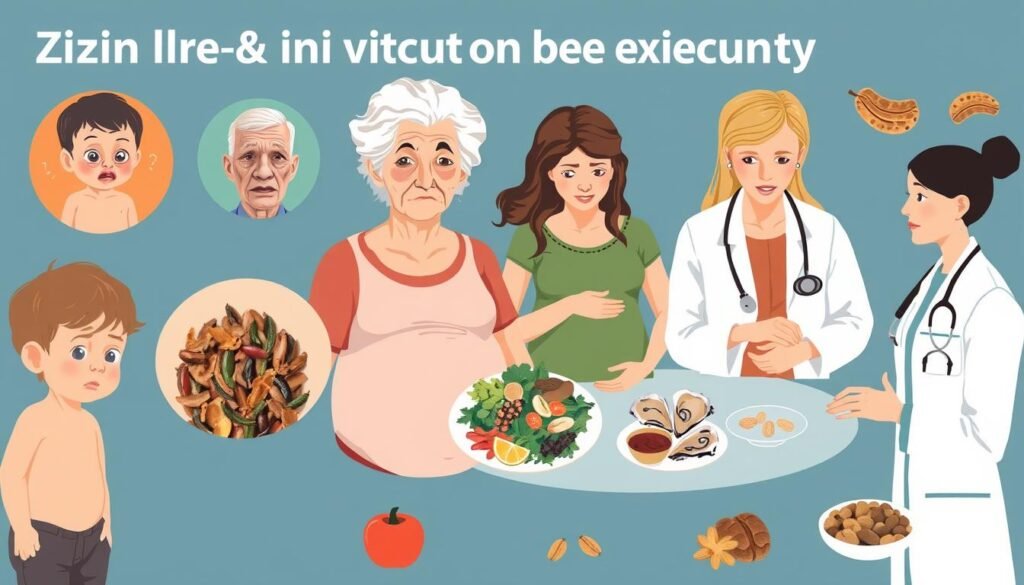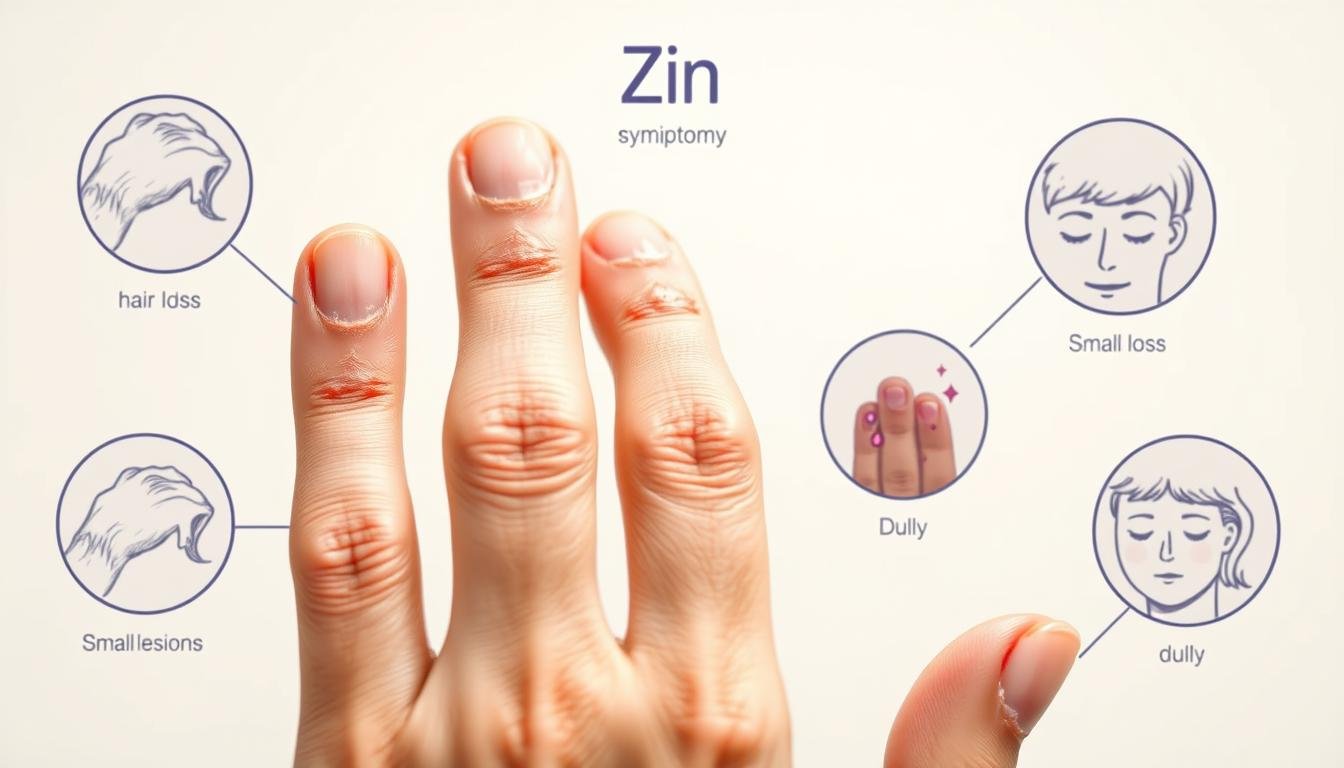Did you know less than 1% of U.S. kids aged 2 to 8 get enough zinc from food and supplements? This fact may shock many, as they don’t realize the crucial symptoms of zinc deficiency affecting their health. Zinc is important for many body functions, like helping the immune system and keeping skin healthy.
When low zinc levels happen, the body shows different zinc deficiency symptoms. It’s key to spot these signs early. These symptoms can look like skin issues, hair falling out, and cuts healing slowly. Also, low zinc can make people get sick more easily. Knowing these signs helps people act early to improve their zinc intake and health overall.
Key Takeaways
- Less than 1% of U.S. children face inadequate zinc intake.
- Zinc is vital for immune function and skin health.
- Common symptoms include skin changes, hair loss, and slow wound healing.
- Recognizing these symptoms early can help prevent long-term health issues.
- Dietary adjustments can improve zinc levels significantly.
Introduction to Zinc and Its Importance
Zinc is a mineral essential for health. It is crucial in many body functions. These include boosting the immune system, helping wounds heal, and aiding in DNA making.
Zinc’s role is critical during key growth times like pregnancy, childhood, and adolescence. Over 100 enzymes need zinc to work properly. So, it’s vital for good health. Getting enough zinc helps avoid health problems. Without it, you might face issues like slow growth and a weak immune system.
Zinc also fights inflammation, adding to its benefits for health. It’s important to eat foods high in zinc. This supports your body and keeps you healthy.
Understanding Zinc Deficiency
Zinc deficiency occurs when you don’t get enough of this essential mineral. Lack of zinc and certain health problems can make it worse. This can lead to slow healing, weak immunity, and slowed growth in kids.
In the U.S., zinc deficiency isn’t very common, but some people are at higher risk. Older adults, pregnant women, vegetarians, and folks with stomach issues might not have enough zinc. It’s important to watch what you eat and know what affects your zinc levels.
It’s key to know how much zinc you need every day. Babies need 2 mg, while guys 14 and older should get 11 mg. Oysters are great for zinc. They have 5.9 mg each. Knowing this helps keep your zinc level just right.
Common Symptoms of Zinc Deficiency
Zinc deficiency can lead to different health issues. It’s important to know these symptoms early on. People might see skin changes, hair loss, less immunity, and slow wound healing.
Skin Changes
Skin alterations are clear signs of zinc deficiency. Symptoms include cracked skin near the mouth and hands. The skin might also look shiny, which is called a “glazed” look. These problems can be confused with other skin conditions.
Hair Loss
Hair thinning or more hair falling out can signal zinc deficiency. This is often with feeling really tired. Such hair loss shows there might be deeper nutritional problems. People may also feel less energetic overall.
Decreased Immune Function
A weak immune system is a big sign of lacking zinc. It can cause more infections, like colds or flu. Zinc is important for our body’s defenses, without enough, we get sick easier.
Wound Healing Issues
Having trouble healing wounds is another issue from not enough zinc. Small cuts heal slower. This is because zinc is needed for our cells to fix themselves properly. Without it, healing is delayed and less efficient.
Symptoms of Zinc Deficiency
Zinc deficiency can really change how you feel every day. People might see problems with their skin and hair, not feel like eating, and have trouble thinking clearly. This could lead to weight loss, feeling tired all the time, getting upset easily, or slow thinking. These issues can make learning hard and affect your mental health.
Around 2 billion people globally might not get enough zinc. This is important to know. Having not enough zinc might cause hair to thin, skin to dry, and lower the body’s defenses. If this gets worse, kids can stop growing properly and get sick more because their bodies can’t fight germs well.
Some people can’t get enough zinc because of stomach issues. Also, eating lots of grains and beans but not enough variety can make it worse. This is more likely as the air gets more polluted, which affects zinc in food.
Knowing the signs of not having enough zinc helps. You can change what you eat or get help from a doctor. Doing this early can make you feel better and avoid bigger health problems from not having enough zinc for a long time.

Other Signs of Zinc Deficiency
It’s important to know the signs of zinc deficiency to stay healthy. There are more signs besides the common ones. Knowing them helps find out if you need better food or treatment.
Loss of Taste and Smell
Not being able to taste or smell is a big sign of zinc deficiency. This can make you not want to eat. Not eating well can make your health worse by missing important nutrients.
Frequent Infections
If you get sick a lot, it might be because of not enough zinc. This makes it harder for your body to fight off germs. So, you might stay sick longer, showing why good zinc levels are key for your immune system.
Digestive Problems
Diarrhea can show that you’re not getting enough zinc. This means your body can’t take in nutrients well. If not fixed, it can lead to more health issues, making it vital to eat foods high in zinc. For more on zinc deficiency, check this link.
Who is at Risk of Zinc Deficiency?
Some people are more likely to lack zinc because of their diets or health issues. It’s important to know who is at risk to help them avoid health problems.
Infants and Children
Babies, especially those only breastfed after six months, might not get enough zinc. Since breast milk doesn’t have enough zinc for a child’s needs. Not getting enough zinc can lead to growth delays and late sexual development.
Pregnant and Breastfeeding Women
Women who are pregnant or breastfeeding need more zinc. It helps their babies develop healthily and supports milk production. Because they need more zinc, they have a greater chance of not getting enough.
Older Adults and Individuals with Nutrient Absorption Issues
Older people and those with issues like Crohn’s disease may not absorb nutrients well. This makes them more prone to not having enough zinc. Eating foods high in zinc could help.

To understand more about issues linked to lacking zinc, click on this link: zinc deficiency.
| At-Risk Population | Reason for Increased Risk |
|---|---|
| Infants | Exclusive breastfeeding beyond six months may lead to inadequate zinc intake. |
| Pregnant Women | Increased zinc needs for fetal development and milk production. |
| Older Adults | Decreased zinc absorption due to aging and possible gastrointestinal issues. |
| Individuals with Restricted Diets | Vegetarians and vegans may have lower zinc absorption compared to those consuming animal products. |
Causes of Zinc Deficiency
Zinc deficiency can come from various sources, greatly impacting health. A main cause is dietary insufficiency. This is common in people following strict diets like vegetarian or vegan lifestyles. Here, zinc is not as easily absorbed, leading to not getting enough.
Certain health issues make the problem worse, especially if they hinder absorption. For example, diseases of the gut, diabetes, and alcoholism can make it hard for the body to take in zinc properly.
Medications are another reason for zinc deficiency. Diuretics, for instance, can flush zinc out, increasing risk for those already low on it. Older adults and individuals with anorexia often lack zinc due to their diets or health concerns. This shows why it’s vital for everyone to ensure they get enough zinc.
Understanding these causes of zinc deficiency helps in spotting those at risk. It also aids in coming up with ways to boost health through proper zinc intake.
Diagnosing Zinc Deficiency
Figuring out zinc deficiency can be tricky. Regular blood tests might not show true zinc levels. Doctors look at various symptoms and use special tests.
Blood plasma tests are usually more accurate for finding zinc shortage. Sometimes, urine tests or hair analysis are used to check zinc amounts.
Knowing the signs of zinc deficiency is key. These signs can be hair loss, lower immunity, and slow healing of wounds. Early diagnosis lets health improve faster. Addressing zinc deficiency could mean changing your diet or taking supplements.
Treatment and Prevention of Zinc Deficiency
To fix a lack of zinc, we need a plan that includes better eating and supplements. Starting with what we eat helps boost zinc levels in our body. Knowing which foods are full of zinc lets us add them to our meals daily.
Dietary Changes to Increase Zinc Intake
Adding foods rich in zinc to your diet can up your zinc fast. Great sources are:
- Red meat
- Poultry
- Seafood, particularly oysters
- Beans and legumes
- Nuts and seeds
- Whole grains and fortified cereals
For vegetarians or vegans, it’s harder to get enough zinc from plants. They need to be careful with their food choices to fight zinc shortage.
Supplementation Guidance
If food alone doesn’t meet your zinc needs, supplements might be the next step. Yet, it’s key to get advice from a health expert to find out how much you need. Too much zinc can lead to issues like sick feelings and trouble digesting, and it might block other important nutrients.
Generally, don’t take more than 40mg of extra zinc daily unless a doctor says so. Watching out for signs of taking too much, such as diarrhea or throwing up, is important. Right food choices and safe supplement use can beat zinc deficiency, improving your health overall.
Long-Term Effects of Zinc Deficiency
Long-lasting zinc deficiency can lead to serious health problems. It weakens the immune system, increasing the risk of infections. People may also heal from wounds slower, making injury recovery tougher.
Growth slowdown in kids is a major issue, affecting their body development. Skin issues that look like eczema can arise due to low zinc. These often start on the face and hands.
Hair loss and weakening of mental abilities are further concerns. A lack of zinc can also harm reproductive health. This affects fertility in both genders.
Knowing these risks highlights the importance of enough zinc in our diet. Eating zinc-rich foods or taking supplements is key. It helps prevent these health problems linked to not having enough zinc.

Conclusion
Zinc deficiency is important to understand because it affects our health in many ways. Zinc helps in many body processes like fighting off illness, building proteins, and healing wounds. So many people, almost 2 billion, might not get enough zinc. This is especially true in places where people eat lots of phytate-rich cereals.
Knowing the signs of low zinc like weak immune systems and skin problems is key. This helps catch the issue early. Studies show taking extra zinc can help kids grow better and mature sexually. And, some serious health issues can happen if you don’t get enough zinc.
To improve health, eating foods high in zinc like lean meats, whole grains, and beans is good. It’s also smart to keep an eye on how much zinc you’re getting. By understanding how important zinc is, we can avoid deficiencies and stay healthier.



